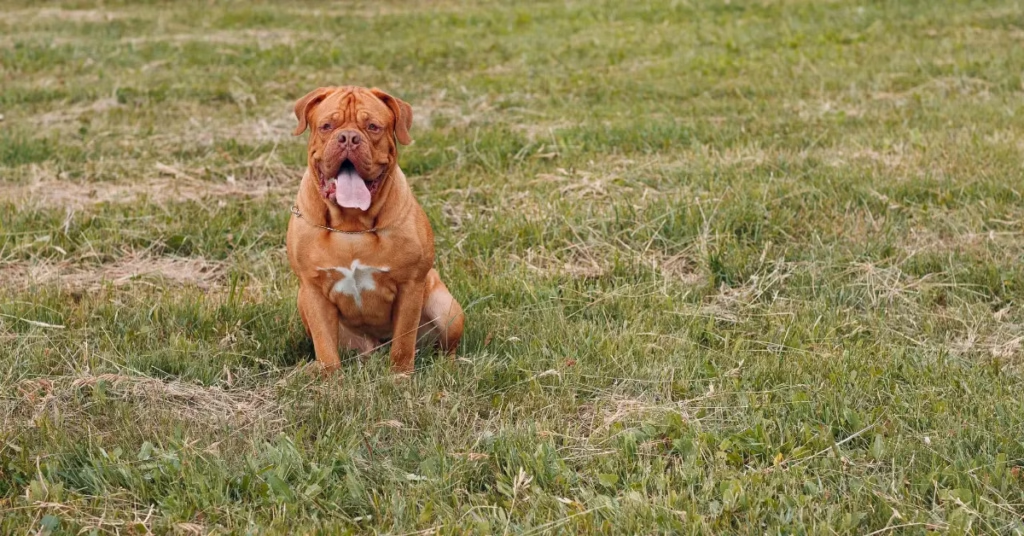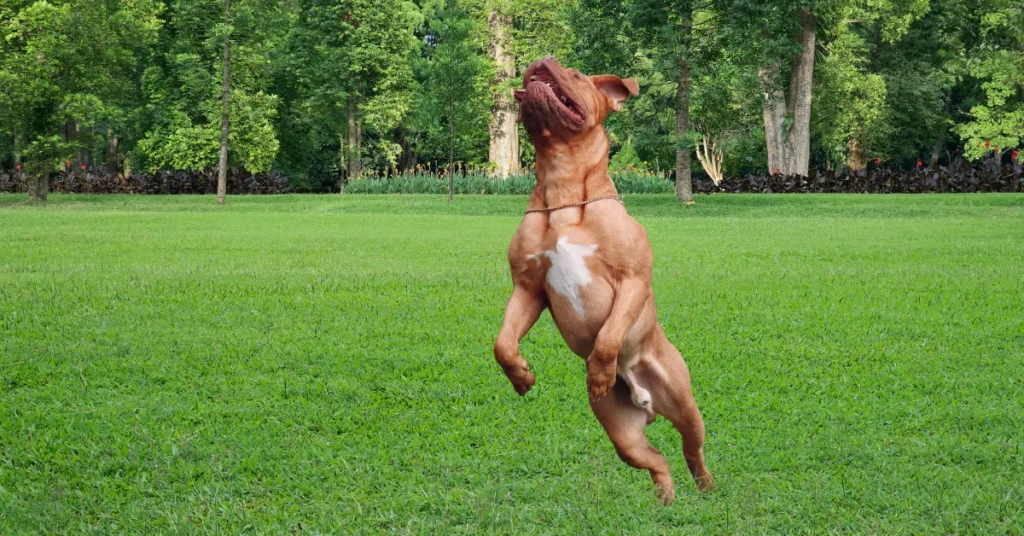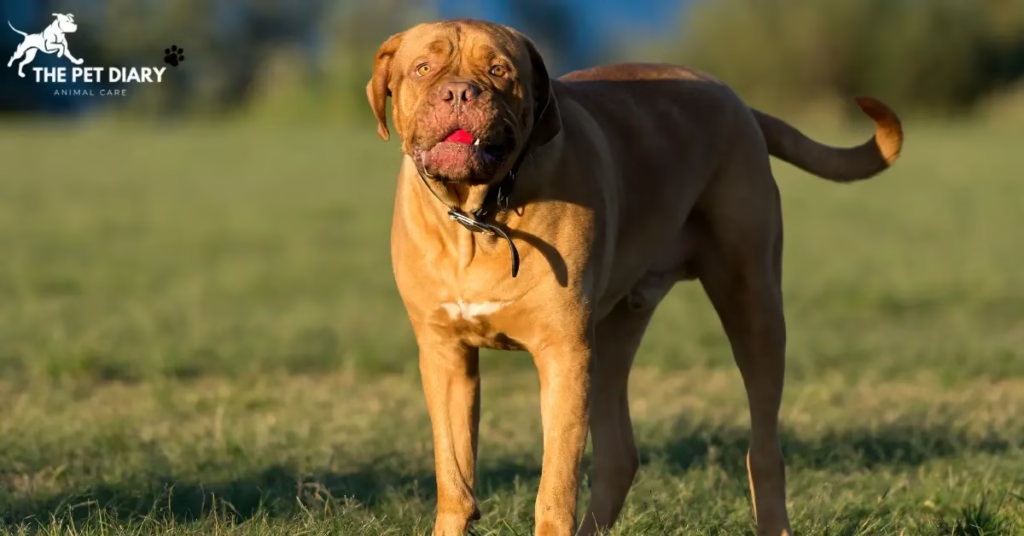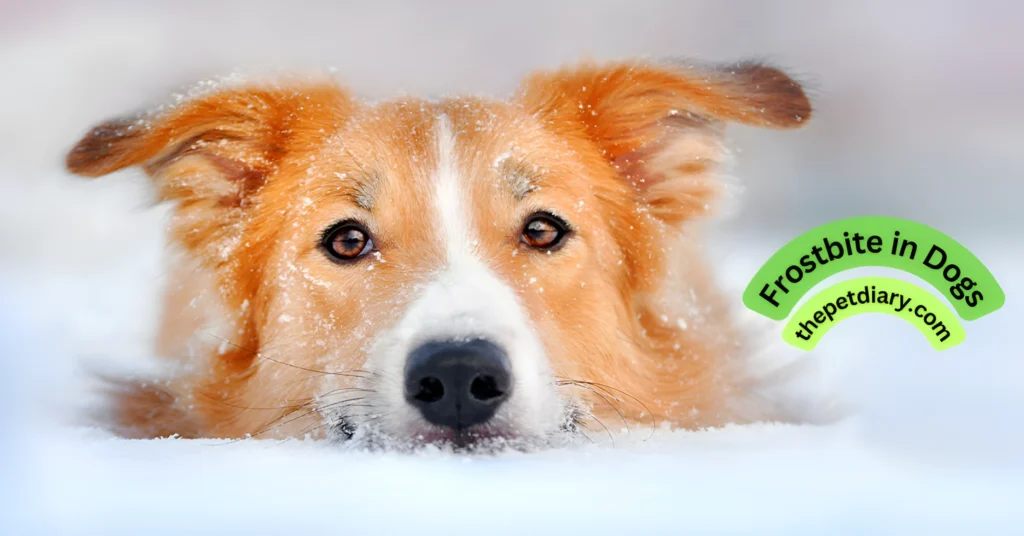Introduction to the Dogue de Bordeaux
The Dogue de Bordeaux, often called the dog de Bordeaux or French Mastiff, is one of the world’s most impressive large-breed dogs. Known for its massive head, muscular body, and famously loving heart, this ancient French guardian has captured the devotion of families and breed enthusiasts around the globe.
Historians trace the dukes de Bordeaux’s lineage back to medieval France, where they guarded estates, pulled carts, and even protected castles. Despite their intimidating appearance, these gentle giants are affectionate companions when properly trained and socialized.
Whether you’re searching for dogue de bordeaux puppies for sale or simply researching the breed, this guide will give you everything you need to know about their temperament, health, feeding, and more.
Breed Overview
Below is a quick-reference table covering the most important details about the Dogue de Bordeaux.
| Trait | Details |
|---|---|
| Origin | France |
| Group | Working / Mastiff |
| Weight | 99–140 lbs (45–63 kg) |
| Height | 23–27 inches (58–69 cm) |
| Dogue de Bordeaux life expectancy | 8–10 years |
| Temperament | Loyal, affectionate, protective |
| Other Names | Dogues de Bordeaux, French Mastiff |
The breed’s defining feature is its enormous, wrinkled head. One of the largest relative to body size in the canine world. Their short, fine coat comes in shades of fawn, ranging from a light “isabella” to a deep mahogany.
Physical Characteristics
The Dogue de Bordeaux is built for power and endurance:
- Head & Face: Broad skull with deep facial wrinkles and a signature undershot jaw.
- Body: Muscular chest and strong hindquarters that support impressive pulling strength.
- Coat: Smooth and low-maintenance, shedding moderately year-round.
- Color: Fawn is standard, sometimes with a black or brown mask.
Despite their size, these dogs are surprisingly agile, making them excellent working companions as well as family pets.
Temperament & Personality

Behind that formidable appearance lies a dog with a calm, loyal, and affectionate disposition. The dogue de Bordeaux is famous for bonding closely with its family and showing gentle patience with children.
Key personality traits include:
- Protective Nature: Naturally alert and brave, they are outstanding watchdogs.
- Affectionate: Thrive on close contact and prefer to be near their people.
- Confident but Calm: When socialized early, they remain composed even in busy environments.
Because of their size and strength, consistent training is essential. Early socialization ensures that dog de Bordeaux puppies grow into well-mannered adults.
Why This Breed Stands Out
The Dogue de Bordeaux gained worldwide fame through the movie Turner & Hooch, where its drooling yet lovable star won hearts everywhere. Today, the breed remains a favorite among those seeking a courageous guardian that’s also a cuddly family member.
Caring for Dogue de Bordeaux Puppies
Bringing home dogue de bordeaux puppies is an exciting adventure, but it requires preparation and commitment. These little giants grow rapidly, so their early months set the stage for a healthy, balanced adulthood.
Puppy Development Timeline
- 0–8 weeks: Pups stay with the mother and littermates for social bonding.
- 8–16 weeks: Critical socialization window—introduce new people, safe environments, and basic commands.
- 4–6 months: Rapid growth phase; begin structured obedience training.
- 6–12 months: Adolescence; reinforce manners to prevent stubborn behaviors.
Whether you’re searching for dogue de bordeaux french mastiff puppies for sale or already welcoming one home, ensure the breeder provides health certificates and early vaccination records. Responsible Dogue de Bordeaux breeders will also allow you to meet the parents, giving you insight into the puppy’s likely temperament.
Health and Dogue de Bordeaux Life Expectancy
The typical Dogue de Bordeaux life expectancy is 8–10 years, which is normal for giant breeds. With proper care, some live even longer.
Common Health Concerns:
- Hip and elbow dysplasia: Regular vet checkups and maintaining a healthy weight are essential.
- Heart conditions: Dilated cardiomyopathy is possible; annual heart exams help with early detection.
- Skin infections: Those adorable wrinkles need regular cleaning to prevent irritation.
Longevity Tips:
- Maintain a lean weight to reduce stress on joints and the heart.
- Provide daily exercise, such as moderate walks and gentle play.
- Schedule annual veterinary exams and stay current on vaccinations.
Feeding & Nutrition
A giant breed like the Dogue de Bordeaux needs a carefully planned diet to support strong bones and muscles while avoiding obesity.
Key Nutritional Guidelines
- High-quality protein: At least 25% protein to support muscle development.
- Balanced calcium-to-phosphorus ratio: Critical during puppy growth to prevent joint problems.
- Controlled calorie intake: Overfeeding leads to rapid weight gain and joint stress.
Recommended Feeding Schedule
| Age Stage | Meals per Day | Daily Calorie Range | Notes |
|---|---|---|---|
| 2–6 months | 3–4 | 1,200–1,500 | Use large-breed puppy formula |
| 6–12 months | 2–3 | 1,500–2,000 | Transition to large-breed adult food gradually |
| Adult (1+ years) | 2 | 2,000–2,500 | Adjust portions based on activity |
| Senior (7+ years) | 2 | 1,600–2,000 | Lower calories; joint supplements recommended |
Offer fresh water at all times and avoid free-feeding to keep weight in check. High-quality kibble mixed with lean meats and vegetables can enhance nutrition.
Training & Socialization

The dogue de Bordeaux is intelligent and eager to please, but its size demands early and consistent training.
Obedience Training
Start obedience classes as soon as possible. Focus on commands such as sit, stay, and come. Because these dogs grow quickly, leash manners are essential to avoid pulling.
Socialization Tips
Expose your dog de Bordeaux puppies to:
- Different people (including children and seniors)
- Other friendly dogs
- Noisy environments such as markets or parks
Well-socialized French Mastiffs become confident, well-adjusted adults who are protective without being aggressive.
Positive Reinforcement
Use treats, praise, and play as rewards. Harsh methods or punishment can damage trust and lead to stubborn behavior.
Exercise Requirements
Despite their size, dogue de Bordeaux dogs are not hyperactive. Aim for:
- Daily Walks: Two 20–30 minute walks.
- Moderate Playtime: Fetch or gentle tug-of-war.
- Avoid Overexertion: Particularly in hot weather, due to their brachycephalic (short-nosed) structure.
Regular exercise supports joint health and mental well-being, extending the dogue de Bordeaux life expectancy.
Grooming Essentials
Grooming this breed is relatively simple:
- Brushing: Once or twice a week with a soft-bristle brush.
- Wrinkle Cleaning: Wipe folds with a damp cloth to prevent infections.
- Dental Care: Brush teeth 2–3 times per week.
- Nail Trimming: Every 3–4 weeks.
This routine keeps your French mastiff puppies healthy and comfortable.
Living With a Dogue de Bordeaux
Owning a French Mastiff means welcoming a calm but powerful guardian into your home.
Space & Environment
- Home Size: A spacious home with a secure fenced yard is ideal. Apartments can work if daily exercise is consistent.
- Climate: These dogs are heat-sensitive due to their short muzzle. Provide shade, fresh water, and avoid intense midday walks during summer.
Family Life
The French Mastiff is incredibly loyal and affectionate, making it a wonderful family companion when properly trained. They generally get along well with children and other pets if socialized early.
Dogue de Bordeaux Price & Buying Guide
Before searching for a dogue de Bordeaux for sale, it’s crucial to understand the financial commitment.
Average Dogue de Bordeaux Price
Prices vary by breeder quality, pedigree, and location:
- Pet-quality puppies: $1,500 – $2,500
- Show-quality or champion bloodlines: $3,000 – $5,000+
- Adoption fees (rescue organizations): $200 – $600
Remember, the purchase price is only the beginning. Food, vet visits, training classes, insurance, and supplies can exceed $2,000 annually.
Choosing Responsible Dogue de Bordeaux Breeders
Reputable breeders prioritize health and temperament over quick sales. Look for breeders who:
- Provide OFA or PennHIP certification for hips and elbows.
- Offer full vaccination and deworming records.
- Welcome home visits or video calls to meet the puppies and parents.
Avoid backyard breeders or those advertising unusually cheap dogue de bordeaux puppies for sale. Low prices often mean poor breeding practices or hidden health issues.
Related Post: Saint Bernard: Temperament, Grooming & Family Living
How to Find Dogue de Bordeaux Puppies for Sale Safely
Searching online for dog de Bordeaux puppies or French mastiff puppies for sale can be tricky. Protect yourself with these steps:
- Research Reviews: Look for consistent positive feedback and an active social media presence.
- Ask for Contracts: A written contract outlining health guarantees and return policy is essential.
- Meet in Person or via Live Video: Never buy a puppy sight unseen.
If you’re importing a puppy, factor in travel costs, import permits, and quarantine requirements in your country.
Adoption & Rescue
Adopting a dogue de Bordeaux is a compassionate option that often saves a life.
- Breed-Specific Rescues: Organizations like French Mastiff Society Rescue or regional mastiff rescues frequently have adults or dogue de bordeaux puppies in need of homes.
- Benefits of Adoption: Lower cost, health screening, and the chance to give a second life to a deserving dog.
- Considerations: Rescue dogs may require extra training and patience, but their gratitude and loyalty are unmatched.
Ongoing Costs of Ownership
Beyond the initial French Mastiff price, plan for yearly expenses:
| Category | Approx. Annual Cost |
|---|---|
| High-quality food | $800–$1,200 |
| Routine vet care | $400–$700 |
| Insurance | $500–$800 |
| Training & supplies | $300–$500 |
| Total | $2,000–$3,000 |
Conclusion:
The Dogue de Bordeaux is a magnificent blend of strength, loyalty, and gentle affection. This powerful yet calm French Mastiff thrives as a devoted family companion and a vigilant guardian, with proper socialization, consistent training, and balanced nutrition. The French Mastiff dog can enjoy a healthy life of 8–10 years or more.
Whether you’re exploring reputable breeders, considering adoption, or simply learning about this remarkable dog, remember that ownership is a long-term commitment. From puppyhood to senior years, regular veterinary care, exercise, and love will ensure your French Mastiff remains a happy, protective, and affectionate household member.
Welcoming a French Mastiff into your life means gaining a courageous companion whose loyalty and devotion will reward you every single day.
👉 Learn more about this amazing breed here: [thepetdiary.com]
FAQS:
1. What is the average Dogue de Bordeaux life expectancy?
The typical French Mastiff’s life expectancy is about 8–10 years. A balanced diet, regular exercise, and routine veterinary care can help some live even longer.
2. Are French Mastiff dogs good with children?
Yes. When properly socialized, the French Mastiff is gentle and patient with kids, making it an excellent family companion.
3. How much does a French Mastiff cost?
Prices vary by breeder and pedigree. Pet-quality French Mastiff puppies for sale usually cost $1,500–$2,500, while show-quality lines can be $3,000–$5,000+. Adoption fees are lower, typically $200–$600.
4. How much exercise does a Dogue de Bordeaux need?
Two daily 20–30 minute walks plus moderate playtime are ideal. Avoid strenuous activity in hot weather due to their short muzzle.
5. What should I feed a French Mastiff puppy?
Feed a large-breed puppy formula with at least 25% protein and a balanced calcium-to-phosphorus ratio. Divide meals into 3–4 servings per day until 6 months old, then gradually reduce to two meals.
6. Do Dogue de Bordeaux dogs shed a lot?
They are moderate shedders. Weekly brushing and regular wrinkle cleaning keep their coat and skin healthy.
7. Where can I find reputable Dogue de Bordeaux breeders?
Look for breeders who provide health certifications (OFA or PennHIP) and allow you to meet the puppies and parents. Avoid anyone offering unusually cheap French mastiff puppies for sale.


